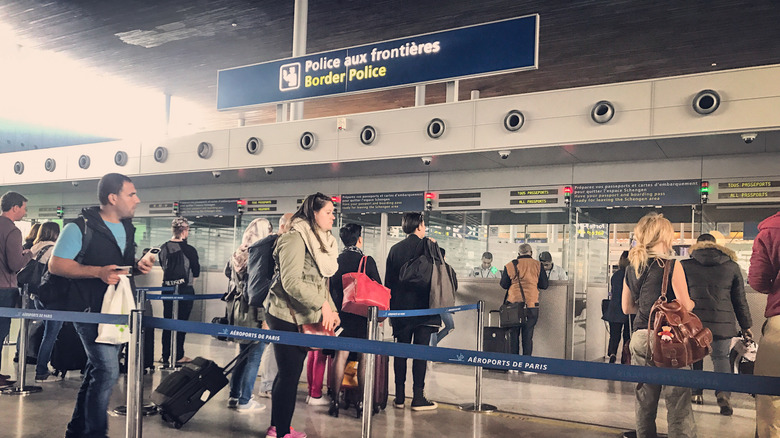Why It May Be A Little More Expensive For U.S. Travelers Planning A European Vacation
If you're an American passport holder, you can visit your favorite destinations in Europe with relative ease. There's an array of amazing, visa-free locales that will let you stay for up to three months to a year, depending on the country. Apart from picking out your flight and hotel, there's typically very little travel red tape to deal with. But in 2025, the rules will change, making it slightly more complicated and expensive to get across the pond from the United States to many European countries.
In 2025, the European Union will roll out the European Travel Information and Authorization System (ETIAS) for 30 of Europe's 45 countries. Originally slated for release in 2024 and then pushed back, the ETIAS is a visa linked to your passport and will cost $8, depending on the extra rate. The ETIAS is intended for short stays of 90 days or less within 180 days. Travelers will need to apply for the visa and get approval before they depart for their destination. Even so, it does not guarantee entry, says the EU website, as border patrol will still have to do their regular protocol.
What you'll need to apply with European Travel Information and Authorization System (ETIAS)
The ETIAS is not live yet, so the website is not currently accepting applications. But when it's rolled out in mid-2025, you'll be able to fill out the application form online or the ETIAS mobile application. You will need an official travel document, like a passport, that is valid for at least three months past the intended duration of your trip. In other words, if you're going in February, your passport must still be valid through May of that year.
You will also be asked for personal details, like what you'd put down on a driver's license, including your first and last names, birthdate, home address, email address, and phone number. In addition, you'll have to provide your place of birth, your parents' first names, your level of education, your current occupation, and details about your trip. The application will also ask if you have any criminal history, if you've been asked to leave any country, or if you've recently traveled through a war zone.
Last, the application will ask for a payment card for the $8 fee. You won't have to pay this fee if you are under the age of 18 or over the age of 70. If you are a family member of a European Union citizen, you will be exempt as well.
ETIAS approvals and appeals
After you're done applying, you will receive a confirmation number with your own ETAS number, which you'll need to keep for your future reference. Most applications will be processed within a few minutes, but it can take up to four days. In some cases, you may be asked to provide additional documentation or participate in an interview, which can bump back your timeline to 14 or 30 days. Do keep this in mind when making your travel plans and booking tickets.
Once an outcome has been reached, you'll receive an email notification. If you are not approved, you'll be able to appeal. The email will explain the specific reason you were denied, along with country-specific information about how to move forward. If you are approved, your ETIAS visa will be valid for three years or until your passport expires.
While European travel won't be as laid-back as before, it's still a relatively painless process compared to some of the tougher visas around. For 2024, at least, it's business as usual.


